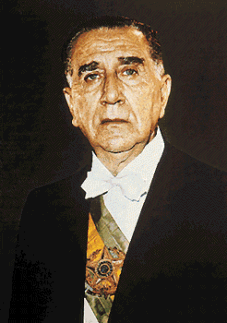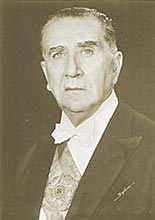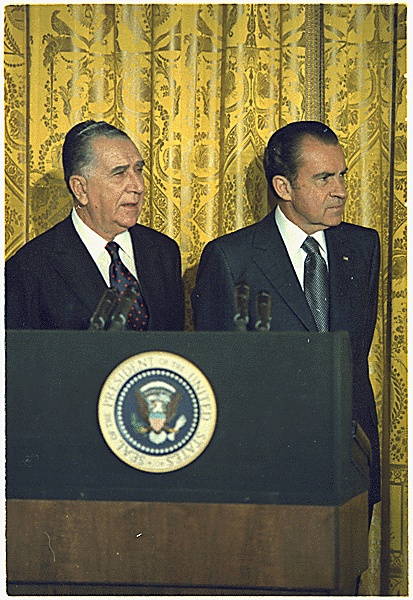<Back to Index>
- General Field Marshal Job - Wilhelm Georg Erdmann Erwin von Witzleben, 1881
- Novelist Samuel Butler, 1835
- President of Brazil Emílio Garrastazu Médici, 1905
PAGE SPONSOR



Emílio Garrastazu Médici (December 4, 1905 — October 9, 1985) was a Brazilian military leader and politician. His rightist rule from 1969 to 1974, marked the apex of military governments in Brazil.
Médici was born in Bagé, Rio Grande do Sul state. From his father's side, he was the grandson of Italian immigrants who went to Uruguay and then re-migrated to Brazil. From his mother's side he was descended from a Basque family. In the 1920s he entered in the Army where he was steadily promoted, becoming general in 1961.
Médici was a close ally of Marshal Artur da Costa e Silva,
who became president of Brazil in 1967. Also in this year Médici
was appointed chief of the National Information Service (SNI).
Two years later he become commandant of the Third Army and was chosen to become president of Brazil by the Military High Command. Médici had his presidency confirmed by the electoral college formed by the National Congress, succeeding Gal. Costa e Silva, who had suffered a stroke. Médici took oath on October 30, 1969 and served until the end of his term, March 15, 1974.
During his tenure, Médici established a strong military government, the most repressive of Brazil's military regimes, accompanied by torture and strict censorship of the press. During his rule an existing guerilla activity was defeated, led by Carlos Marighela and Carlos Lamarca. The movement was destroyed and Marighela and Lamarca killed.
The Brazilian economy grew rapidly at a rate of 10% per year during his term. Large construction projects were undertaken, including the Transamazônica road, the Itaipu dam and Rio – Niterói bridge. On the other side, the economic growth benefited mainly the richer classes — by the end of 1970, the official minimum wage went down to US$ 40/month, and more than one - third of the Brazilian workforce who had theirs wages tied to it lost about 50% of its purchasing power in relation to the 1960 levels at the end of the Juscelino Kubitscheck administration.
The official censorship tightened its grip over the media, and the import of the men's magazines Playboy, Penthouse and Lui and the West German news magazine Der Spiegel was banned because they offended “morality and proper behavior”.
In 1971, President Richard Nixon and Médici discussed coordinating efforts to help Cubans and Chileans overthrow Fidel Castro and Salvador Allende respectively. National security advisor Henry Kissinger's account of the December 9, 1971, White House visit by Médici was written "for the president's file" and classified Top Secret. It was declassified on September 4, 2008, and made public in July as part of a State Department publication on U.S. foreign policy.
Kissinger's memo shows it was Nixon who raised the subject of Allende during the meeting, asking for Médici's views on Chile: "Médici said Allende would be overthrown", [Nixon] then asked whether Médici thought that the Chilean armed forces were capable of overthrowing Allende. Médici replied that he felt that they were and made clear that Brazil "was working towards this end." The memo notes Nixon and Médici also discussed whether Cuba should have readmission to the Organization of American States. For his part, Médici noted that Peru was trying to persuade the OAS to consider readmitting Cuba and asked Nixon how they should cooperate to oppose the move. Nixon said he would study the issue and reply to Médici "privately." The OAS voted to lift sanctions on Cuba in 1974.